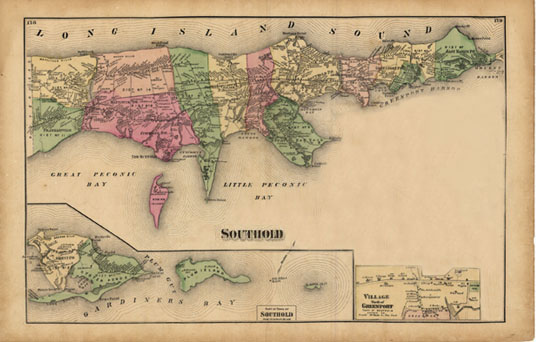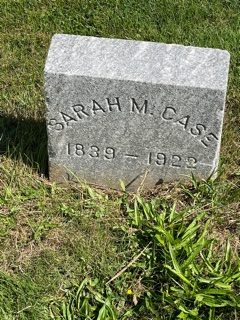“Southold is a pleasant country village.”
Lavinia Goodell, July 1, 1863
Other than her sister, Maria Frost, and her cousin, Sarah Thomas, Sarah Case was one of Lavinia Goodell’s closest friends. Sarah Case held such a special place in Lavinia’s heart that Lavinia’s 1879 will bequeathed her $1500 and a gold locket.
It is unknown when and where Lavinia and Sarah met, but it seems likely they became acquainted in Brooklyn in the early 1860s. Lavinia first mentioned Sarah in an 1863 letter to her sister, saying, “I wish you knew her. She is a very fine girl. She is learning to be a telegraph operator.”
Like Lavinia, Sarah Case was born in 1839. She grew up in the village of Southold, on the North Fork of Long Island. Her father was a farmer. Many historians consider Southold to be the first English settlement on Long Island, dating back to 1640.

In the summer of 1863, Lavinia visited Sarah in Southold and had a grand time. She wrote her sister:
Southold is a pleasant country village, with agreeable young society, among which I formed some pleasant acquaintances. Mr. Case’s family are farmer’s folks; live plainly but pleasantly, and did all they could for my happiness…. Sarah is looking well and easy, and appears gay in society. She doesn’t look over 18, lots of beaux down there, and I doubt not she’ll be married in less than half a dozen years, and a great deal better off than if she’d had him. I think she’s “a heap” too good for him!
The identity of the gentleman referred to as “him” is never confirmed, but letters written in the ensuing decade indicate that Sarah was unlucky in love on more than one occasion and never married. In 1868, Maria Frost wrote to Lavinia:
I think I had rather be Sarah Case with an opportunity to improve and take care of myself than to be the wife of such a man as she might have had. I should think she would rejoice in her freedom. It makes me indignant now to think how he deceived us all, making us think he was such a good pious young man.
And later that year, Maria wrote again:

During the 1860s and 1870s, Sarah Case moved between Southold and New York City, and for a time held a position at the Christian Union newspaper office in the latter. There is also mention of a short stint at the telegraph office in Hastings-on-Hudson north of Manhattan. While employed in the city, Sarah roomed with Lavinia at Aunt Mira and Uncle John Hill’s home in Brooklyn for a short period. Lavinia was happy to have her friend’s company and told her parents, “I am sorry for Sarah. She is so feeble and has to work so hard and has always lived so uncomfortably, that I am quite willing to make some sacrifices for her accommodation. Her society will be pleasant. She is a very fine character; good, sensible, and noble.” Although Lavinia’s mother felt sorry for Sarah, she was concerned that the young woman was not paying her fair share of the living expenses and urged Lavinia to insist that her pal contribute.
By 1873 Sarah Case had returned to her position at the Southold telegraph office and apparently remained there for the rest of her life. She was active in the Womens Christian Temperance Union and wrote letters and articles in favor of women’s rights. In a letter published in a Southold newspaper in 1873, Sarah took issue with a minister who announced in his sermon, “The husband is the head of the wife, and her authority must be inferior to his.” Sarah responded, “I for one protest against any such one-sided arrangement; but affirm that if there must be a balance of authority on either side, it should certainly be on the side of the mother.” Sarah’s letter prompted a response from a writer who said, “I must say that I do not fancy strong-minded women” and advised her to read her bible with a different spirit.
Although there are many references to Sarah’s poor health, she outlived Lavinia by forty-two years, dying in 1922 at the age of 83. A local newspaper said:
The death of Miss Sarah Case … removed one of our oldest and highly-respected citizens, and one who will be greatly missed, especially in the various societies where her enthusiasm and loyalty had its benign influence. She was first vice-president of the W.C.T.U. and a most faithful and fearless worker and was also identified in the Universalist Aid society, where her pleasant presence will be sadly missed.
She is buried in the Case family plot at the First Presbyterian Church in Southold.

Sources consulted: Lavinia Goodell’s letters to Maria Frost (April 6, 1863; July 1, 1863;) Maria Frost’s letters to Lavinia Goodell (July 23, 1868; November 8, 1868); Lavinia Goodell’s letter to Clarissa and William Goodell (April 24, 1871); the Long Island Traveler (July 31, 1873; August 7, 1873); the Country Review (Riverhead, New York, May 12, 1922).







